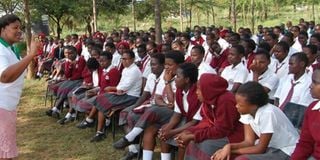West Pokot records dramatic rise in FGM cases

What you need to know:
- FGM and child marriages cases in West Pokot have hit the roof, forcing stakeholders to embark on an urgent mission to get the situation to normalcy.
- County has experienced more than 500 cases of FGM since schools were closed.
- Tapach Ward leads with about 300 cases, Masol Location at 159, Mosop l50 and Chepkokogh Location about 10 cases.
- Anti-FGM Board terms the situation as “serious", met overnor Prof John Lonyangapou to discuss the rampant FGM cases.
With schools closed due to the Covid-19 pandemic, cases of Female Genital Mutilation (FGM) in West Pokot County have reached alarming levels.
The county is on the edge as cases of FGM and child marriages hit the roof, forcing the government and other stakeholders to embark on an urgent mission to get the situation to normalcy.
Domtila Chesang, the founder of I-Am Responsible Foundation, an organisation that champions against FGM and child marriages in the area says the situation on the ground is almost getting out of hand.
Ms Chesang told Nation Gender Desk the county has experienced more than 500 cases of FGM since schools were closed with Tapach Ward leading with about 300 cases.
Masol location, she said, has witnessed 159 cases, Mosop l50 cases, while Chepkokogh has recorded about 10 cases.
Emboasis and Kanyerus villages in Kongelai Division have each recorded five cases.
DISTRESS CALLS
“The situation here has actually exploded and many girls have undergone the cut. We receive distress calls every day from the community whose girls are about to undergo the cut asking for our assistance,” she said.
She added that after the girls undergo FGM, they are married off with Pokot North leading in these cases.
“Here, child marriage has been normalised and not much is said about it, yet it is rampant. After FGM, these girls will be married off,” she said.
The girl-child defender, however, added that they have embarked on civic education in the area to tame the rising number of FGM and child marriage cases.
She commended the local administration for their support in the war against FGM.
Anti-FGM Board CEO Bernadette Loloju termed the West-Pokot situation as “serious and we are not resting until it is contained”.
Ms Loloju said her agency had a team on the ground working with the Ministry of Interior and the county government to arrest the situation.
“Our team together with other stakeholders is on the ground doing everything possible to put the situation under control. A number of people have been arrested for violating the Anti-FGM law. We have to win the war against the outlawed practice,” said Ms Loloju.
The CEO added that the vice is being performed near the Kenya-Uganda border.
She noted that she is optimistic a pact signed by ministers from East African to tame cross-border FGM will ensure perpetrators are apprehended.
CROSS BORDER FGM
Public Service and Gender Cabinet Secretary Prof Margaret Kobia last year led her counterparts from the Eastern Africa region in an inter-ministerial meeting on ending cross border FGM.
The ministers signed a pact in Mombasa after a two-day conference that brought together anti-FGM crusaders and experts from Somalia, Ethiopia, Uganda, Tanzania and Kenya.
Participants discussed ways of tackling the emerging trend of cross-border FGM, where communities advancing the practice cross national borders to seek or carry out FGM in neighbouring countries.
On Monday, the Anti-FGM Board team met West Pokot governor Prof John Lonyangapou in Kapenguria, where they discussed the rampant FGM cases in the county occasioned by the prolonged closure of schools due to the pandemic.
In a statement, Anti-FGM Board said they also discussed a common multi-stakeholder approach to avert the mass FGM cases being witnessed in the county.
MARRIED OFF
The agency is working with I-Rep Foundation, Action Aid Kenya, World Vision-Kenya, local and national government officers to create awareness on safeguarding girls as schools remain closed.
The governor regretted that many girls have been cut and married off during this period.
“The governor decried that despite huge investments in education by his government in budgetary allocation, FGM was a serious hindrance to the county as girls drop out of school for marriage once they are cut,” read the statement in part.
West Pokot has been marked as one of Kenya’s hotspots with a prevalence rate of 74 per cent.
In November last year, the government launched the National Policy on Abandonment of FGM, which seeks to eradicate the practice in the country by 2022.
According to the Kenya Demographic and Health Survey 2014, about 21 per cent of women and girls aged between 15-49 years in Kenya have undergone FGM.
And despite the national decline in the prevalence, the practice is still high in some communities such as the Somali at 94 per cent, Samburu 86 per cent, Kisii 84 per cent, Maasai 78 per cent and West Pokot 74 per cent.





